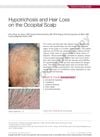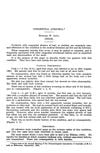 130 citations,
January 2005 in “American Journal of Clinical Dermatology”
130 citations,
January 2005 in “American Journal of Clinical Dermatology” Eating disorders like anorexia and bulimia cause skin problems, and dermatologists can help detect these disorders early for better treatment outcomes.
 57 citations,
November 1987 in “Pediatric Dermatology”
57 citations,
November 1987 in “Pediatric Dermatology” Children's hair grows in different types from before birth through puberty, with growth rates and characteristics varying by age, sex, and race.
[object Object]  48 citations,
September 2009 in “Dermato-endocrinology”
48 citations,
September 2009 in “Dermato-endocrinology” Anorexia nervosa can cause skin problems, which may help with early diagnosis and usually improve with treatment.
 38 citations,
July 1998 in “Journal of surgical oncology”
38 citations,
July 1998 in “Journal of surgical oncology” A woman with breast cancer developed a rare condition causing excessive fine hair growth on her face and body.
 15 citations,
September 1999 in “British Journal of Dermatology”
15 citations,
September 1999 in “British Journal of Dermatology” Epimorphin, a protein, plays a key role in the development of hair follicles in human fetuses, but it doesn't help in maintaining the stem cell population of the follicular skin layer.
 7 citations,
July 2003 in “Clinics in Dermatology”
7 citations,
July 2003 in “Clinics in Dermatology” The article helps identify common, non-harmful skin conditions in newborns to avoid undue concern and treatment.
 5 citations,
April 2007 in “Expert Review of Dermatology”
5 citations,
April 2007 in “Expert Review of Dermatology” Dermatologists can help detect and manage eating disorders by recognizing skin changes.
 1 citations,
May 2023 in “Cutis”
1 citations,
May 2023 in “Cutis” Eating disorders can cause skin problems, which may help with early diagnosis and treatment.
 1 citations,
March 2010 in “Internal medicine journal”
1 citations,
March 2010 in “Internal medicine journal” A 72-year-old man with sudden taste issues and hair growth was diagnosed with a severe stomach cancer and died within 5 months.
 June 2012 in “Springer eBooks”
June 2012 in “Springer eBooks” Skin changes can indicate starvation and nutritional deficiencies in anorexia nervosa.
 December 2024 in “Nutrients”
December 2024 in “Nutrients” Skin, hair, and nail changes can help detect eating disorders early.
January 2022 in “The Pan African medical journal” Hypertrichosis causes excessive hair growth and needs psychological support due to its impact on self-esteem.
 January 2012 in “Journal of the Dermatology Nurses’ Association”
January 2012 in “Journal of the Dermatology Nurses’ Association” The document explains hair growth, hair loss types, and other hair-related terms.
 September 2023 in “Cutis”
September 2023 in “Cutis” A baby girl has a hair disorder called monilethrix, causing fragile hair that may improve over time.
 10 citations,
June 2011 in “Archives of Dermatology”
10 citations,
June 2011 in “Archives of Dermatology” Finasteride caused blisters on hands and feet.
 5 citations,
December 1964 in “Australasian journal of dermatology”
5 citations,
December 1964 in “Australasian journal of dermatology” Congenital atrichia is a rare condition where children are born without hair, and treatment is often ineffective.
 1 citations,
June 2019 in “Current developments in nutrition”
1 citations,
June 2019 in “Current developments in nutrition” A patient with Ehlers-Danlos Syndrome improved after treatment for fat malabsorption and essential fatty acid deficiency.
 1 citations,
October 2015 in “CRC Press eBooks”
1 citations,
October 2015 in “CRC Press eBooks” Nutricosmetics with active ingredients can help with hair loss and improve hair growth.
[object Object]  July 2015 in “Cambridge University Press eBooks”
July 2015 in “Cambridge University Press eBooks” The document concludes that treatments for female hair loss and excess body hair are available, but managing expectations is important.
 June 2012 in “Springer eBooks”
June 2012 in “Springer eBooks” Eating disorders can cause various hair problems, and while hair loss in these disorders is linked to metabolic syndrome, treatment focuses on specific medications and lifestyle changes for the syndrome.
 June 2018 in “Advances in Cosmetic Surgery”
June 2018 in “Advances in Cosmetic Surgery” Hair loss caused by genetics and hormones; more research needed for treatments.
 1113 citations,
August 1999 in “The New England Journal of Medicine”
1113 citations,
August 1999 in “The New England Journal of Medicine” Hair follicle biology advancements may lead to better hair growth disorder treatments.
 363 citations,
May 2006 in “Current Opinion in Psychiatry”
363 citations,
May 2006 in “Current Opinion in Psychiatry” Anorexia and bulimia lead to serious health problems and increased risk of death, requiring aggressive treatment.
 169 citations,
August 2004 in “Baillière's best practice & research. Clinical obstetrics & gynaecology/Baillière's best practice and research in clinical obstetrics and gynaecology”
169 citations,
August 2004 in “Baillière's best practice & research. Clinical obstetrics & gynaecology/Baillière's best practice and research in clinical obstetrics and gynaecology” Lower doses of treatments for hirsutism and acne in PCOS are effective and cause fewer side effects.
 166 citations,
September 2011 in “Dermatologic Surgery”
166 citations,
September 2011 in “Dermatologic Surgery” Platelet-rich plasma with a new carrier significantly increases hair thickness without serious side effects.
 111 citations,
March 1951 in “Annals of the New York Academy of Sciences”
111 citations,
March 1951 in “Annals of the New York Academy of Sciences” Understanding the mouse hair cycle is crucial for cancer research.
 98 citations,
October 2012 in “Dermatologic Clinics”
98 citations,
October 2012 in “Dermatologic Clinics” Eating the right nutrients can improve hair health, but taking extra supplements usually doesn't help unless you have a deficiency.
 97 citations,
September 2011 in “British Journal of Dermatology”
97 citations,
September 2011 in “British Journal of Dermatology” The human hair follicle can store topical compounds and be targeted for drug delivery with minimal side effects.
 75 citations,
November 2007 in “Clinical endocrinology”
75 citations,
November 2007 in “Clinical endocrinology” Certain medications including flutamide, spironolactone, and others effectively reduce excessive hair growth in women, especially when combined with lifestyle changes.
 55 citations,
November 2018 in “American journal of human genetics”
55 citations,
November 2018 in “American journal of human genetics” Mutations in the LSS gene cause a rare type of hereditary hair loss.





























